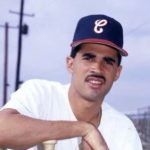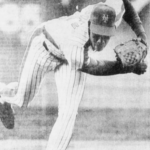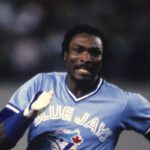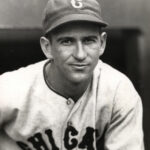Ozzie Guillen Stats & Facts
Ozzie Guillén
Position: Shortstop
Bats: Left • Throws: Right
5-11, 150lb (180cm, 68kg)
Born: January 20, 1964 in Ocumare del Tuy, Venezuela
High School: Caracas (Caracas, Venezuela)
Debut: April 9, 1985 (15,007th in major league history)
vs. MIL 5 AB, 1 H, 0 HR, 0 RBI, 0 SB
Last Game: October 1, 2000
vs. BOS 0 AB, 0 H, 0 HR, 0 RBI, 0 SB
Full Name: Oswaldo Jose Guillen
Twitter: @OzzieGuillen
View Player Info from the B-R Bullpen
Nine Players Who Debuted in 1985
Andres Galarraga
Paul O’Neill
Ozzie Guillen
Devon White
Jose Canseco
Cecil Fielder
Teddy Higuera
Shawon Dunston
Todd Worrell
Notable Events and Chronology
Biography
The Chicago White Sox drew criticism for trading Cy Young Award pitcher LaMarr Hoyt to the San Diego Padres in December 1984 in a seven-player deal that yielded them prospect Ozzie Guillen. In fact, general manager Roland Hemond was fired not long after masterminding the deal. But Hemond had the last laugh, as the 21-year-old Venezuelan shortstop easily outdistanced Milwaukee’s Teddy Higuera to capture the 1985 AL Rookie of the Year award. Guillen committed just 12 errors to lead AL shortstops in fielding and set a record for White Sox shortstops. His .273 batting average was higher than expected, and he was soon considered one of the better shortstops in the majors.
A naturally friendly player, Guillen had a bubbly attitude that was at first interpreted by opponents as hot-dogging. But as the shortstop became better known throughout the league, his critics vanished and his popularity rose. With a quick tongue and confident nature, Guillen developed a leadership quality that was greatly appreciated in the clubhouses and on the field.
Guillen’s speed and range enabled him to make dozens of acrobatic plays at short, quickly drawing comparisons not only to Venezuelan shortstops of the past like Luis Aparicio and — his idol — Dave Concepcion, but also to Ozzie Smith. His defensive tools were so masterful that by 1988 he established himself as an All-Star.
He went back to the Midsummer Classic in 1990 and 1991, mostly on the wings of his popularity and flashy play in the field. But on April 21, 1992, an outfield collision with teammate Tim Raines ended his season on, as Guillen suffered torn ligaments in his knee and was forced to undergo surgery. After he spent the rest of the year in rehab, he bounced back in ’94, tallying a .280 batting average, above the league average for shortstops. However, his speed — one of his major assets in the 80’s — was gone, and Guillen could no longer steal bases as he once did.
While stealing bases wasn’t a problem for Guillen pre-surgery (he averaged 24 between 1987 and 1991), getting on base was. Guillen set a major-league record in 1996 for walking only ten times in 150 games. His on-base percentage never rose above .325, and once even dipped to .265. He had poor strike zone judgment, and though he didn’t whiff as much as the heavy sluggers of the league, Guillen often swung at balls over his head or in the dirt.
However, his popularity and style kept him afloat both on the White Sox and in the bigs. Craig Grebeck, his replacement in 1992, was objectively considered a better hitter than Guillen, but even so, the team was relieved to have the gregarious Ozzie back in 1993.
The Venezuelan stayed in Chicago through 1997, and was granted free agency at the end of the season. Signed by the Baltimore Orioles in January 1998 to back up the incumbent infield of Mike Bordick and Roberto Alomar, Guillen was released in May. He didn’t stay unemployed for long though, as the Atlanta Braves snatched him up five days later to replace the injured Rafael Belliard as Walt Weiss’ back up. Guillen became the team’s much-needed utility player, logging time at every infield position. The following year he made it to his first World Series as a late-innings defensive replacement with Atlanta.
In 2000, with the emergence of young shortstop Rafael Furcal, Guillen became expendable. After the Braves released him in April, he signed with the Tampa Bay Devil Rays just a week later as a utility player. With the Rays, Guillen performed as he did with the Braves — though he didn’t get a chance to start too often, he had a firm role as a backup who could adapt to any position.
@ET-DC@eyJkeW5hbWljIjp0cnVlLCJjb250ZW50IjoicG9zdF90YWdzIiwic2V0dGluZ3MiOnsiYmVmb3JlIjoiTGVhcm4gTW9yZSBhYm91dCB0aGUgdGVhbXMsIHBsYXllcnMsIGJhbGwgcGFya3MgYW5kIGV2ZW50cyB0aGF0IGhhcHBlbmVkIG9uIHRoaXMgZGF0ZSBpbiBoaXN0b3J5IC0gLSAtIC0gLSAtIC0gIiwiYWZ0ZXIiOiIiLCJsaW5rX3RvX3Rlcm1fcGFnZSI6Im9uIiwic2VwYXJhdG9yIjoiIHwgIiwiY2F0ZWdvcnlfdHlwZSI6InBvc3RfdGFnIn19@
Factoids, Quotes, Milestones and Odd Facts
Played For
Chicago White Sox (1985-1997)
Baltimore Orioles (1998)
Atlanta Braves (1998-1999)
Tampa Bay Devil Rays (2000)
Guillen’s White Sox threw four complete games in the 2005 ALCS, becoming the first team to do that in one post-season series in nearly 35 years.
Similar: Alfredo Griffin
Awards and Honors
1985 AL Rookie of the Year
1990 AL Gold Glove
Line Drives: Links on the Web about Ozzie Guillen
Guillen takes World Series trophy to Venezuela
Post-Season Appearances
1993 American League Championship Series
1998 National League Championship Series
1998 National League Divisional Series
1999 National League Championship Series
1999 National League Divisional Series
1999 World Series
Where He Played: Shortstop
Quotes From Guillen
“Well, we are supposed to make it. Win or lose, it’s always the manager’s responsibility. Last year, we were winning with ‘Ozzie Ball.’ This year we are losing with ‘Ozzie Ball.’ I’m the face of the ballclub and I will take the heat.” — late in the 2006 season
“I did everything in my power, and so did my coaching staff. The players, even though the season is not the one they want, they did it, too. We just didn’t play up to our expectations.” — on the White Sox failure to get back to the playoffs in 2006
All-Star Selections
1988 AL
1990 AL
1991 AL
Best Strength as a Player
Ability to throw the ball from several angles.
Largest Weakness as a Player
He was a poor base stealer for most of his career, but he also didn’t walk much, had no power, and hit for a pretty low average.









